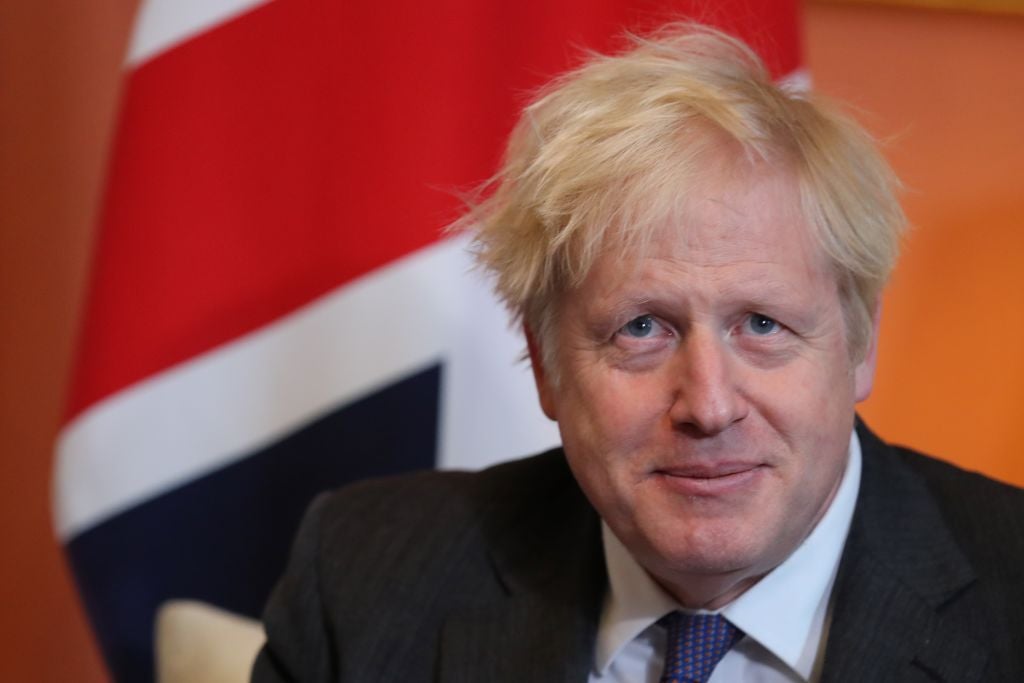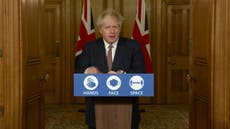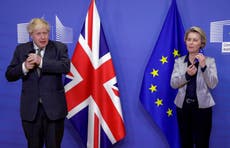As things stand, Brexiteers have got what they always wanted
Brexit, ultimately, is the sacrifice of prosperity for sovereignty but many Brexiteers are still happy to pay the price


Four and a half years on from the referendum, almost a full year since the UK left the European Union, three weeks out from the end of the transition period, and British people and British businesses still have no idea what to expect from Brexit.
Three hours of face-to-face talks and four hours of the same over the telephone, between Boris Johnson and the European Commission president Ursula von der Leyen would appear to have done precious little to bridge the gap between the two sides, which are, as both have said, “very far apart”.
The prospect of a no-deal Brexit looms very large indeed, and with it come a vast range of emotions. Those who never wished to leave the European Union saw all this coming, of course – it was always going to be a disaster. That Brexiteers’ very best case for Brexit – that the UK had become intertwined with the European Union in unimaginably complex ways, and as such had ceased to be a sovereign nation – was also the best case for not leaving; it would be unimaginably complex, miserable and involve large amounts of pain.
Even more obviously, it has become overwhelmingly clear to see that, for four and a half years, both before the referendum and after it, Brexiteers have made absurd promises that will not be kept. The “easiest trade deal in history” is not going to happen. Even if it does, it will be a bare bones arrangement that will inflict huge damage on both sides, but mostly this one. “There will be no downside to Brexit, only a considerable upside,” said David Davis. It is hard to imagine there being many people, in all human history, more consistently wrong about something, in so very many ways, than David Davis has been on Brexit.
Naturally, there is a tsunami of Remainer anguish and anger ready to be unleashed, that is already taking the form of betrayal. That, in other words, it will become, or already has become, the role of those who never wanted to leave the European Union in the first place to be aggrieved on behalf of those who did. When the impossible traffic jams begin at Dover, the car plants close in Sunderland, and the retirement plans in sunny Spain go to the wall, a Brexit will have arrived that isn’t what people voted for.
Trouble is, it’s not at all clear that’s true. For four and a half years, the point has been relentlessly made, not least by me, that the Brexiteers lied to win the referendum and they won’t deliver on any of their promises. That is true, but it is only partially true. It is true that it was a strategic decision to boil the EU question down to two issues – that Turkey was about to join it, and that leaving would make more money available for the NHS – and that both those claims were false. But they did contain a truth within them.
Stop the average Brexiteer in the street and, if he or she can remember, I am prepared to speculate that their two big reasons for voting for Brexit at the time will have been the same as the two big reasons they were given. To stop sending British taxpayers’ money to the EU, and to end free movement of people.
Things might be falling apart across the negotiating table in Brussels and London, but these two aspects are holding firm. While Messrs Frost and Barnier have made precious little progress all year, Priti Patel has wasted no time developing and implementing a new, mean and vicious immigration system. The Conservative Party social media accounts have taken great delight in creating little graphics in which the Union Jack flutters as they exalt delivery on their promise to end free movement of people.
For Remainers, of course, this is heartbreaking. It is just another reason to loathe Brexit. Having your own flag waved to celebrate the removal of your rights, to narrow your horizons, curtail your opportunities and make your life just that little bit more parochial is one of the most severe miseries of the whole process. But not if you’re a Brexiteer. It’s what you wanted, and you’ve got it.
If economic misery is on the way, as it may well be, then it cannot be said that there was no warning. I do not fully subscribe to the theory that Brexiteers voted for economic hardship. It is often claimed that because David Cameron and George Osborne and co spoke of emergency budgets and immediate recession that Brexit voters knowingly voted to be made poorer. To an extent, they did, but it is absurd to suggest, as Brexiteers now like to, that Leave voters voted for the misery of which Remain warned them, and not the fantasy Leavers sold them.
Of course, we can never fully know or understand – another reason why referendums are a terrible idea. But even so, Brexit, ultimately, is the sacrifice of prosperity for sovereignty. That is the equation in all trading arrangements and this one is no different. Many Brexiteers were happy to pay the price.
In the days before the vote, whenever it was pointed out that a vote to leave was a leap into the unknown, that it was a monumental decision with precious little clue as to how it would turn out, the same counterargument would appear. That remaining was just the same, that the status quo would not be maintained.
It was not a wholly convincing argument, but it is nevertheless the case that when British people voted in the referendum in June 2016, almost none of them would have heard of the French political party En Marche, which by then was just two months old, nor its leader Emmanuel Macron.
It would not have been known that France would choose to express its power and sovereignty through the institutions of the European Union. Had the UK voted the other way, Prime Minister David Cameron, or George Osborne or quite possibly Boris Johnson, would now be having to tiptoe through the terrifying domestic politics of quite what the UK’s role might be in the £700bn EU-wide Covid recovery fund (a number that would surely be even bigger, were the UK still a member).
That fund involves, at a time of tremendous domestic financial hardship, Europe’s richer countries bailing out its poorer ones. Not something I personally would have any great objection to, but it is currently something of an electoral fact, at present, that the likes of me are not in the majority.
All these terrible political problems have not even entered the UK’s political radar.
Of course, it may well be, in fact it is almost certain, that a great outpouring of national rage is on the way. That Brexit was always a con, that it didn’t need to be this way. It was, and it didn’t.
But whatever happens, it will be up to Leavers, not Remainers, to say that this is not what they voted for. As things currently stand, they have, for the most part, got what they wanted.






Join our commenting forum
Join thought-provoking conversations, follow other Independent readers and see their replies